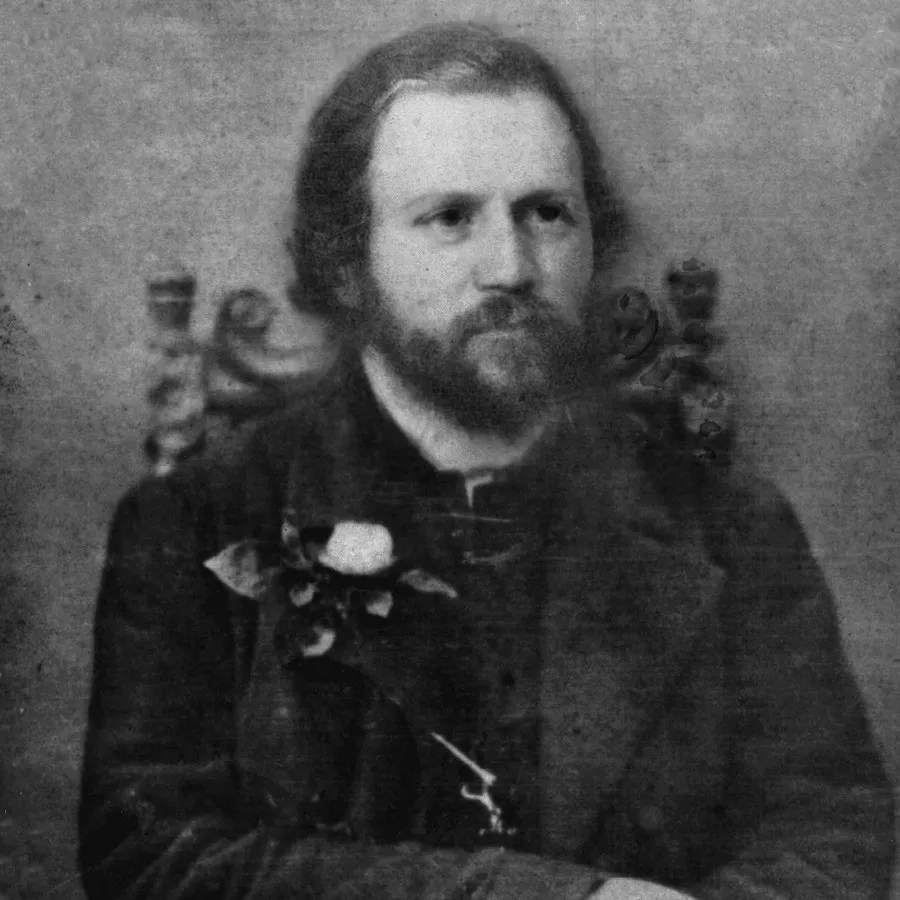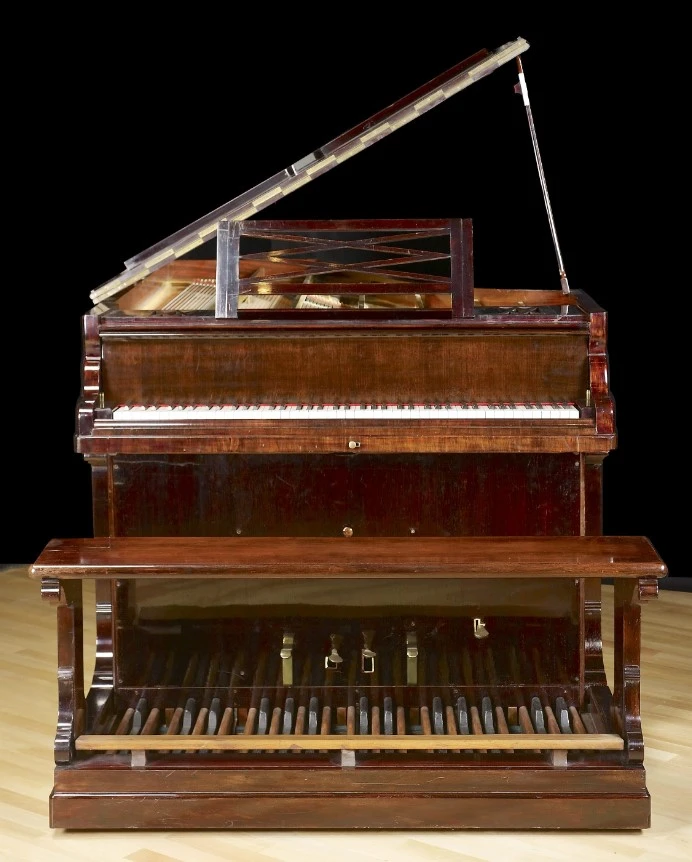Classical Echoes – 12 November 2024

One of 3 known portraits of Charles Alkan
The 19th century was a time of evocation of romanticism and self-expression in music, bringing us some of the most well-known masterpieces. It was an era when new piano leaders gained fame, the most famous of whom were F. Chopin and F. Liszt. While they were widely recognized across Europe and performed in numerous concerts, there wasn’t much space left for other genius but lesser-known pianists.
As a result, the fame of the French-Jewish pianist Charles-Valentin Alkan passed through. But why is that? Was he a bad composer? Was his music too outdated or too modern, too incomprehensible or too primitive? Today, we’ll explore why Charles-Valentin Alkan isn’t famous like his contemporaries.
Born in Paris in 1813, Alkan was the second of six children in a long-established Ashkenazi family. He was a child prodigy who entered the Paris Conservatory at the age of seven. Dedicated to his studies, he became a favorite of his teacher, who also taught Georges Bizet. He quickly gained recognition in Parisian musical circles as a brilliant and virtuosic pianist, which brought him both money and connections in the music world. Even Liszt considered Alkan to be his only true rival.
In the early 1840s, Alkan moved into an apartment in the center of Paris, a building that housed other notable artists, including Chopin. However, Alkan was very private and reclusive, focused only on his work rather than on public life. While he learned organ at the conservatory, the main emphasis was the piano, which he mastered to an extraordinary degree.
He became one of the most virtuosic pianists in France and Europe, often compared to Liszt. By his mid-40s, Alkan was at the peak of his career, primarily as a performer. He was well-known in Parisian high society and among fellow musicians.
His close friendship with Chopin contributed to his musical understanding and gave him insights as a composer. Consequently, he grew interested in composition, experimenting on his preferred instrument, the piano.

Square d’Orléans – a building where Alkan, Sand and Chopin used to live
Despite his friendships with prominent musicians of his time and other well-known people, like Hugo and Sand, Alkan remained extremely reclusive, introverted, and old-fashioned. He didn’t seek popularity and wasn’t a “musical star.” He hated the atmosphere in the music world, where everybody tried to outperform each other. This made him even more private.
Periods of depression and reclusiveness were largely due to his introverted nature and strict tastes. One reason was his illegitimate son. Having highly conservative and traditional views, he couldn’t deal with this fact. This made him withdraw from public life and interrupted his performing career at its peak. Alkan devoted himself entirely to work and had a very limited social life, unlike Liszt or Mozart, who were always at the center of fancy Viennese and Parisian life.
Alkan spent his entire life in Paris and was deeply influenced by French literature and cultural heritage. He didn’t leave the city even during the French revolutions in 1830 and 1848, staying home even when bullets hit his walls.
Most of his compositions are impossibly difficult to play and often are filled with megalomania. For example, his Concerto and Symphony for solo piano span multiple movements and last up to 40 minutes. He clearly wanted to make the piano sound like a full-scale orchestra and push human capabilities to the edge.

Pedalièr – an original modified piano Alkan used to play
It’s undeniable that Alkan was an outstanding piano virtuoso and held a solid reputation, especially in Paris. However, as a composer, he wasn’t seen as significantly by the public. And there are some of his differences from other pianists and composers.
1. He Didn’t Seek Fame.
Alkan remained isolated and introverted throughout his life. Unlike Liszt, Chopin, Brahms, or Wagner, he didn’t seek fame and created music out of personal passion and beliefs.
In addition to music, he started massive projects, such as translating the Old and New Testaments from Hebrew to French, and he even wanted to transcribe the entire Bible into music.
2. He Wrote Mainly for Himself.
Alkan was primarily interested in mastering his technique and musical skills, as well as teaching piano to others. He focused more on self-development than public appreciation, which kept his work largely unknown.
Chopin and, especially, Liszt were musical celebrities recognized across Europe. They always wanted to charm audiences and pull the heart strings. While they also had complex and more personal compositions, their main works were more suitable for the public.
3. His Music Didn’t Align with the Style of His Time.
Most major composers, particularly those of the 19th century, developed a recognizable style. Mozart had his piano concertos, Beethoven his sonatas and symphonies, Liszt his études, and Chopin his nocturnes. Alkan, however, defied this by experimenting with unusual musical forms and compositions.
He created music as challenging as a symphony for solo piano, or a set of études for the left hand alone, which are nearly impossible to play even for modern pianists like Hamelin.
4. He wasn’t considered a composer but a pianist.
In Paris, Alkan was probably the best pianist. Always participating and performing in salons for ‘high society,’ as well as performing on stage, his talent was incredible from the perspective of technique and masterful execution of the hardest piano works.
Of course, he performed many of his own works; however, the audience always expected from him an incredible burst of piano playing. Maybe it’s one of the reasons why so many of his works are so difficult and overstated.
The same thing is seen with Liszt, as he was associated primarily with piano virtuosity and not as a composer. However, having a more solid and varied musical repertoire, he gained fame and is now one of the most passionate and loved composers of the 19th century.
5. He Was Both Ahead of His Time and Too Traditional
Alkan’s only piano sonata, The Man in the Four Ages, consists of four movements that represent a man in his 20s, 30s, 40s, and 50s, respectively. It’s unclear if Liszt actually studied the piece, but it’s believed that it inspired him to write his Sonata in B minor.
His music was both too innovative and out of step with his era. It didn’t comply with the standards of the time and existed apart from it. It was important for him to create an image in his pieces and depict his inner world, the only way he could express himself as a recluse.
This is seen in almost all of his works. While much of it is too hard to play and sometimes exaggerated, he has some calm and peaceful pieces. For example, his prelude The Song of the Mad Woman on the Seashore. There’s not much happening, just bass A-flat minor chords and a repeating melody on top. It has mysterious and frightening feelings, and when the piece culminates at the ending, it reaches a climax, representing the madness of the woman.
Song of the Madwoman on the Seashore (yt: Jane Ahmon)
Even in his later years, it was quite uncommon to write such music without predefined structure and standards. It was considered to be modernism and would later become a more defined style in the music of Ravel, Debussy, or Scriabin.
On the other hand, he was very antiquated and conservative. He wasn’t happy with the musical trends of his time and was obsessed with the great music of past eras, especially Beethoven and Baroque. He was very famous for performing Bach, described as “not as masterful as Liszt but more clear and poignant”. He also did numerous transcriptions of Mozart’s and Beethoven’s orchestral works for piano alone (basically, he didn’t need any other instrument because he could make the piano sound like all of them).
The main reason why Alkan is not famous is because of his reclusiveness and interruptions in his career. A musician and, especially, a composer is in a public profession and must always keep a record of themselves. That was not the case with Alkan, as he preferred a quieter life and didn’t strive for popularity.
Discussing his music, it’s reasonable that not everyone will enjoy it. For many, it sounds too harsh, loud, and overdone. Yet others find it very unique, interesting, and powerful, full of emotions and passion. There’s no doubt that he was as talented as others, both as a composer and a performer. He just was different and not for everyone.
In conclusion, music is a personal preference for each of us. While we consider Chopin or Liszt to be great and genius composers, it doesn’t mean that everyone should listen only to them. Nevertheless, lesser-known composers like Alkan may become a hidden gem for many listeners and be more loved than others.
Many great pianists, like Hamelin, Gibbons, or Maltempo, dedicated numerous recordings to help explore his music. And Alkan, being more extraordinary and exceptional than others, will always find his listener, who will appreciate his music!